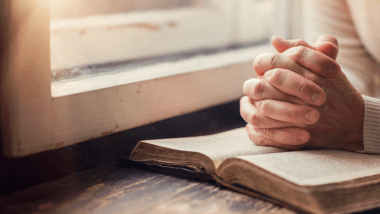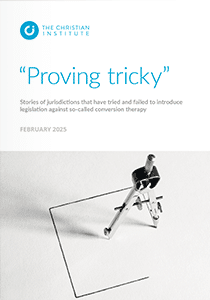Peers have criticised a proposed law that could criminalise ordinary Christians and loving parents.
The House of Lords was debating Baroness Burt of Solihull’s Private Member’s Bill, which seeks to outlaw attempts to “change” or “suppress a person’s expression of sexual orientation or gender identity”.
However, the vague proposals have the potential to criminalise Christians who engage in prayers or pastoral conversations with people who are struggling with LGBT issues.
‘Badly drafted and dangerous’
A number of Peers spoke out strongly during the debate, including Lord Forsyth of Drumlean who said that “in nearly 40 years in Parliament, I have never seen a more badly drafted or dangerous piece of legislation”.
He said the vagueness of the Bill meant it could ban parents from telling their children not to dress as a member of the opposite sex, or take dangerous puberty-blocking drugs, calling this eventuality “extraordinary”.
Lord Forsyth also dismissed Baroness Burt’s claim that the Bill is not an attack on free speech, saying: “Of course it’s an attack on free speech if parents feel they can’t give guidance to their children. It’s an absolute basic duty of parents to give guidance to their children and to prevent them from suffering any harm. It criminalises advice given in good faith.”
‘Crude’ legislation
The Peer was also incredulous at the wording “any practice aimed at a person or group of people which demonstrates an assumption that any sexual orientation or gender identity is inherently preferable to another”.
He remarked: “‘Demonstrates an assumption’? Are we now going to criminalise people for thinking things? Because that’s what ‘demonstrates an assumption’ means.”
The former Secretary of State for Scotland concluded: “We normally in this House introduce legislation in order to fix a problem, not create new ones. This undermines the family, attacks free speech, freedom of thought and even religious belief. It is a dangerous, crude piece of legislation in a hugely complex and controversial area which is not suited to private legislation.
“It has all the characteristics of something written on the back of a beer mat after an unruly discussion in a pub.”
Outlawing speech
Later in the debate, Lord Morrow noted: “Having listened to those who support this Bill, it seems we are talking about outlawing certain kinds of speech. I think most of us know that physically abusive behaviour of every kind is already outlawed by existing legislation, and this Bill says nothing whatsoever about physical abuse. So that’s not what the Bill is targeting.
“What we are discussing is making people criminals for what they actually say.”
He noted that the word ‘therapy’ does not appear in the Bill, instead it only refers to ‘practices’, and explained: “We have to assume that the mere act of speaking to another person must constitute a practice.” He added that the word ‘harm’ is also absent, meaning that “objectively harmless speech” is at risk of being outlawed.
Like Lord Forsyth, he also highlighted the word ‘assumption’ in relation to negative views on gender or sexual orientation, and said: “If you hold to historic, orthodox Christian teaching on sexual ethics, that seems to be the kind of assumption this Bill is actually targeting.”
Criminalising opinions
He concluded: “This is not a good Bill. Badly conceived because it seeks to criminalise people for their opinions, and badly executed, because it makes no effort to mitigate the damage to legitimate free speech and private family life.
“But I don’t think it is possible to legislate on this without causing these kinds of problems, because those who want a conversion therapy ban want to target opinions. It is not about abuse, it is not about coercion, it is not about causing harm. None of these words appear in the Bill.
“It is about punishing what some people regard as wrong opinions. And that’s not the kind of law any of us should be willing to go along with.”
‘Chilling’
Baroness Foster of Aghadrumsee said: “I am concerned about the ambiguity in this Bill, it’s vagueness. Although it is short, its reach is extensive, and the implications for free speech, for freedom of religion, and for parenting are, I think, quite chilling.
“There is a danger of this Bill creating a new orthodoxy, and a whole category of opinions that must not be uttered at the risk of criminal conviction.”
She noted that supporters of a ban in the UK often point to the existing draconian law in Victoria, Australia, which outlaws parents who object to their children being given puberty blockers, and says not affirming someone’s gender identity is an illegal practice.
‘Quite wrong’
The former Leader of the DUP added that Baroness Burt’s Bill is “very broad”, and could criminalise those who object to gender ideology, but pointed out that the belief that a person cannot change their biological sex “is protected by equality and human rights laws”.
She added: “My Lords, it is clear that an offence looking at people’s assumptions is getting into the realm of examining whether their thoughts and attitudes are acceptable. This is very dangerous territory, and I urge the House to reject this Bill.”
Biologist Lord Winston also spoke against the Bill, saying that while he is pro-LGBT, there is still too much unknown about transgenderism to ban discussion of it.
He said: “I think it would be quite wrong for us to pass this Bill, and I cannot see any serious amendment that would really help it on its progress.”
Starmer commits to ‘all-encompassing conversion therapy law’
Peer: ‘So-called conversion therapy is already banned’
Christian MP warns new ‘conversion therapy’ law would endanger gender-confused kids
CI steps up campaign against ‘ideological and restrictive’ conversion practices Bill



